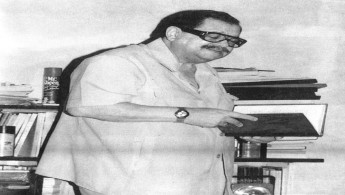For Nihad Quali, for love
On Wednesday, al-Araby al-Jadeed's Arabic edition remembered the late Syrian actor Nihad Quali, who died in 1993. Maher Mansour shed light on his genius for artistic creativity. I would like to add that the Arab press has done him a great injustice by forgetting him.
I get excited about Nihad Quali because, may his soul rest in peace, he brought joy to Syrian stage and drama. My peers share my enthusiasm for him, especially Bashar Ibrahim, whose work documenting the great artist’s work is considered to be among the most distinguished.
One could say this is my nostalgia for the past, as a human being and especially as an Arab. A nostalgia for the days of black and white television, perhaps? But Husni al-Burazan and Sah al-Noum were not the only creative works Nihad Quali produced. Burazan’s personality was Quali’s creation and it stuck with him through the rest of his career. His television series was watched throughout the Arab world in the 1970s, and was especially popular from the Mediterranean to the Gulf.
Biting satire
| This simple tale was created using archetypal Levantine personalities, which became the caricatures of Arab television drama. |
Burazan worked at a magazine, but couldn’t complete any of his articles because of the dirty tricks played on him by his colleague Ghawar al-Tosheh (played by the Great Syrian actor Duraid Laham) to stop him marrying his female co-star Fatoum Hees Bees. At the end of the series, Burazan has his chance when Ghawar is thrown in jail, but another man wins Fatoum’s heart and marries her instead.
Fatoum owned the small hotel in a street named Kul meen eedo ilo ["Everyone’s hand helps themselves"], symbolising the state of a chaotic coexistence in the street. The satire was biting, but the naiveté of the series was beautiful.
This simple tale was created using archetypal Levantine personalities, which became the caricatures of Arab television drama. My nostalgia for the series goes beyond the humour, to the sense of childish joy that suffused it, perhaps because there is little that inspires feelings of joy on Arab television today.
Now, one may stumble on an appealing or a technically proficient production every year or so, or perhaps every decade or so, but the bittersweet humour of Nihad Quali’s work in Sah al-Noum and his other numerous humorous works has never been equalled. Other comedies from Egypt and Syria simply do not have the same biting humour.
Perhaps Arab audiences have become accustomed to stiff, lifeless formality as a consequence of the cultural devastation that surrounds us. This devastation is not limited to the cultural sphere, it now has laid waste to our nations, our capitals and our civilisation.
Quali's legacy
It is not that we have become more difficult to please, it is that Nihad Quali is unmatched as a writer, a performer and an artist.
| Nihad Quali is unmatched as a writer, a performer and an artist. |
He was a customs official who fell in love with the theatre and dedicated his life to it, going on to become director of the National Theatre in Syria.
With Duraid Lahham, he was part of a successful comedy duo that excelled at short works, on television and radio alike. He crafted personalities for screen and stage and acted in many films, comedies and plays, before directing Dai’yet Teshreen ["Teshreen village"], a play recognised as a comedy classic.
That he also wrote children’s books is a testament to his versatile talent and sharp wit.
“If we want to know what was happening in Italy, we need to know what is happening in Brazil…” was the first sentence in an article Quali’s character Hosni al-Burazan was writing, another which he never managed to finish. One wonders if one could say that if we wanted to know what was happening in Syria today, Nihad Quali’s homeland, we should know what is happening in Iran?
This article is an edited translation from our Arabic edition.



